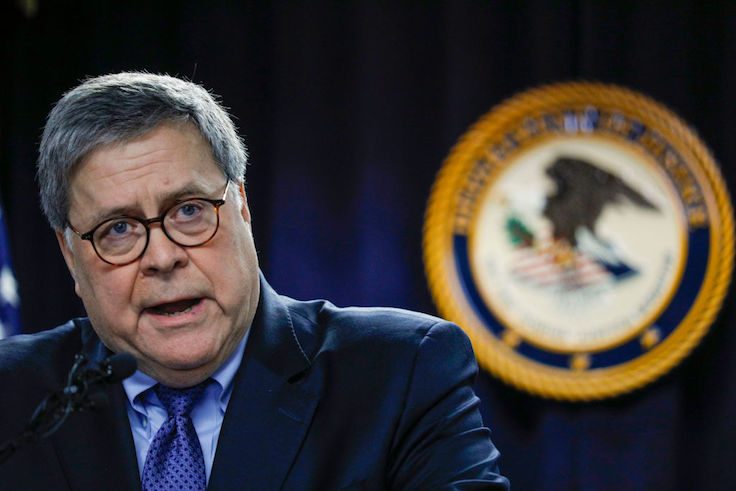Attorney General William Barr on Wednesday announced the formation of a presidential commission on criminal justice, revitalizing a body that in the 1960s fundamentally altered the American criminal justice system.
The new members of the Presidential Commission on Law Enforcement and the Administration of Justice took their oath of office, administered by Barr, Wednesday morning, and immediately set to work on their agenda for the coming months. Barr's remarks linked their work to the last such commission, which was organized by President Lyndon Johnson.
"President Trump is an unwavering supporter of our men and women in blue, and he recognized that this commission is much needed to support law enforcement," Barr said. "It is, to be sure, long overdue. The last time there was a national commission on law enforcement was in 1965."
Barr's allusion to the Johnson crime commission sets the stage for a comprehensive reassessment of the criminal justice system. The new commission's work will likely highlight how the challenges of criminal justice have changed radically over the past half century.
The new commission is a diverse group of law enforcement officers, litigators, and stakeholders from local, state, and federal jurisdictions. It will be chaired by Phil Keith, who currently serves as the director of the Community Oriented Policing Services office within the Justice Department. Other board members include local sheriffs and police chiefs, U.S. attorneys, the Florida attorney general, and the acting director of the Bureau of Alcohol, Tobacco, Firearms, and Explosives.
This group, Barr said Wednesday, will discuss key issues facing law enforcement in the 21st century. These include the challenges of mental illness; improving officer recruitment, training, and retention; understanding the rise of mental health problems among police officers; the challenges of new technologies; the causes and effects of "diminished respect" toward police officers; and the better incorporation of social services organizations into the policing process.
The push to establish a new commission on crime has commanded bipartisan backing. Senators Gary Peters (D., Mich.), Lindsey Graham (R., S.C.), and John Cornyn (R., Tex.) introduced legislation to establish a commission modeled on the one from 1965. President Donald Trump issued an executive order in October that formally established the commission Barr swore in Wednesday.
Cornyn cheered Wednesday's news as a step in the right direction for American criminal justice.
"An objective review system is necessary to reform our outdated criminal justice system and strengthen law enforcement's ties to our communities," he told the Washington Free Beacon. "I'm grateful to the Administration for taking this important step, and I look forward to working with them to build upon their efforts to reform our justice system and increase public safety."
Trump's order articulates the commission's function as the study of "issues related to law enforcement and the administration of justice." It is also instructed to, within a year, furnish Barr with a final report, presumably similar in scope to the Johnson commission's own 350-page report.
That original 1967 report, The Challenge of Crime in a Free Society, is widely considered—even by critics—a landmark in the history of American criminal justice. During the 1964 presidential election, Johnson opponent Barry Goldwater slammed the incumbent for his lack of focus on America's rising crime problem. After Johnson won, he placed greater emphasis on law and order.
The 1967 report is responsible for many of today's standard law enforcement practices. The Challenge of Crime recommended technological improvements including separate radio bands for police, fingerprinting systems, and an emergency hotline number that later became 911. It was one of the first major documents to recommend combating "ordinary street crime" as a matter of policy, concretizing Johnson's "war on crime." It also systematized the role of the federal government as a major funder of local and state law enforcement, with spending reaching $56 billion by 2016.
The Johnson Crime Commission followed on the 1929 National Commission on Law Observance and Enforcement, generally known as the Wickersham Commission, which conducted some of the first systematic observation of law enforcement in the United States.
Barr, in his remarks, noted that radical changes in technology make a new crime commission all the more urgent.
"The incredible pace of technological change has meant the rapid evolution of new ways to commit and conceal crimes," he said. "All of you, because you're on the front lines, see this every day—from the proliferation of synthetic opioids to the use of warrant-proof encryption and the dark web to sexually exploit the most vulnerable members of society."
Important, too, is the trend of crime rates since the '60s. In the years immediately following the Johnson commission, America experienced a precipitous increase in violent crime, with the per capita rate rising nearly 400 percent between 1960 and 1991. Then, crime began an almost equally precipitous decline—today, it stands at roughly the lowest rate in the past 30 years.
Since multiple factors contribute to the crime rate, there is no one explanation as to what caused crime to rise and then drop. The new commission is not tasked with offering such an explanation, but it will have to think hard about how to make sure a crime wave does not happen again.
